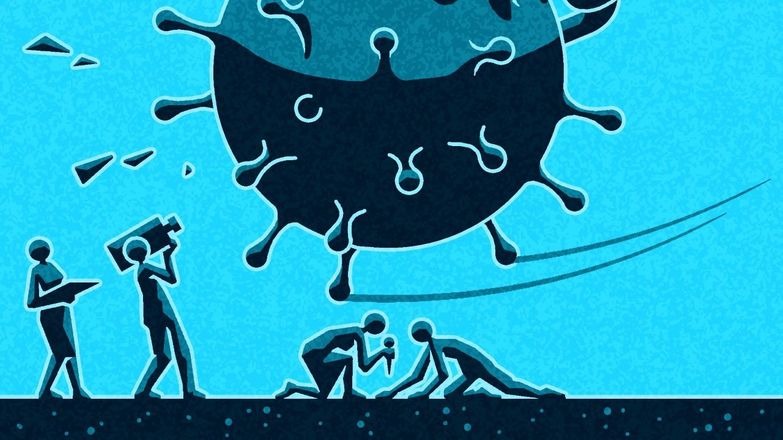From Health Crisis to Good News - A recovery plan for the news industry in Ireland
The NUJ in Ireland has published a call for a recovery plan for local and national media.
From Health Crisis to Good News - A recovery plan for the news industry in Ireland
The NUJ in Ireland has published a call for a recovery plan for local and national media. Both are playing a vital role in protecting communities from covid-19 and both have suffered in the economic downturn it has resulted in.

From Health Crisis to Good News: A recovery plan for the news industry in Ireland
NUJ proposals for a news recovery plan in Ireland.

News Recovery Plan
The NUJ has launched a News Recovery Plan for the UK and Ireland to sustain the press and media through the Covid-19 crisis and reinvigorate the indus...
Seamus Dooley, NUJ Irish secretary, said:
"Journalism is not just business and a healthy democracy requires a healthy media industry. On this World Press Freedom Day 2020 the NUJ in Ireland calls on all parties engaged in government formation talks to commit to a media rescue plan and to the establish of a Commission on the Future of the Media in Ireland.
"In Ireland we have witnessed a new acceptance that the values of the market do not hold the key to protecting the welfare of our nation. There has been a welcome shift in public policy in health, education and social protection. A similar approach is needed to ensure the survival of local and national journalism."
The covid-19 crisis has had a devastating impact on the Irish media industry.
As Ireland sets about meeting the enormous challenges of the health crisis, the NUJ is calling for a government led strategic initiative to rescue the media, so that it may continue the vital role it has played on a daily basis during this unprecedented period of social and economic uncertainty.
As the consequences of the covid-19 emergency on the Irish media become more apparent there is an urgent need for a reimagining of the state's role in facilitating a diverse, vibrant and independent media, in enabling public interest journalism and in looking at imaginative solutions to secure employment in the industry.
The present crisis has shown just how vital it is to have a news media providing accurate information, how enthusiastic people are for trustworthy content and how essential it is that the government and authorities are held to account.
The crisis has also exposed the fragile state of the Irish media, the consequences of underinvestment by media organisations in editorial resources and the paucity of action by successive governments to protect public interest journalism.
Seamus Dooley added:
"Public service and commercial broadcasting organisations, national newspapers, the regional press, specialist titles and online, digital publications are tethering on the brink of ruin at a time when the role of the media was never more important to citizens."
That means bold, imaginative polices, including specific measures to protect the regional press and specialist publications, across all platforms. Targeted measures aimed at supporting jobs and quality journalism, and bolstering independent, diverse, ethically produced content are needed. Specific intervention is needed to protect and invest in hyperlocal and community enterprises.
The short-term measures proposed by the NUJ include:
- The transfer of all media policies to a new department, the department of arts, culture and media, from the department of communications, climate change and environment would mark a significant statement of commitment to the protection and development of the media.
- A windfall tax of 6 per cent on the tech giants, using the UK digital services tax model, towards funding a news recovery plan.
- Tax credits and interest free loans to support journalist jobs, for frontline reporters covering the covid-19 crisis and recovery.
- A review of the covid-19 payment schemes with a view to greater flexibility in assisting freelance media workers who have sustained income losses but may still be in receipt of low earnings in a manner which excludes them from benefits.
- No public money for firms making compulsory redundancies, cutting pay, giving executive bonuses or blocking trade union organisation. The NUJ is proposing the criteria already set out in competition legislation be used as a template for assessing applications for assistance. These criteria are set out in the media merger guidelines (May 2015) and set out factors to be considered in the public interest in determining approval of media mergers, having regard to media plurality and diversity and include editorial independence and regard to regulatory compliance and engagement with the industrial relations machinery of the state.
- Companies receiving public funds are prohibited for five years from engaging in mergers and acquisition activity or leveraged buyouts that result in job losses or pay reductions.
- Strategic investment in government advertising, including the hyperlocal sector, involving central and local governments and public bodies. The response of the media to the covid-19 crisis and the increased engagement with readers reflects the relevance of the media as a reliable medium of news and public information.
- The establishment of an innovation fund to promote public interest journalism at local and national level, developing the model used in the Simon Cumbers media fund established by Irish Aid.
- Free vouchers for online or print subscriptions for all 18- and 19-year-olds and tax credits for households with subscriptions.
- Free vouchers for online or print subscriptions to all over 70-year-olds, in line with the free TV licence scheme.
- Immediate steps to address the financial crisis in public service broadcasting.
The medium-term measures include:
- Establishment of a government-funded journalism foundation to invest in local news and innovative journalistic projects.
- Confer 'asset of community value' status on local newspapers ensuring that titles are preserved for potential community ownership.
- Allow the establishment of charitable status to media outlets that want it.
- Employee representation of 25 per cent on executive boards in receipt of public funding.
- Independent and sustainable funding for public service broadcasting that protects its universality and prevents government interference.
- Nationwide media literacy strategy to tackle disinformation and fake news.
- Reform of media ownership rules, with a strengthened public interest test.
- Training that opens up access to journalism, including apprentices for school-leavers. The absence of comprehensive in-service training is a regrettable feature of the Irish media industry.
- Grant aid to enable training for journalists to transition from print to digital publications and to acquire new skills.
- Protection for whistleblowers and monitoring the potential impact of surveillance technologies being considered in response to covid-19 challenge and easing of lockdowns.
- Support for a global framework to protect and promote journalism and improve press freedom.
Media Access:
In addressing the role of the media, it is important to reassert the importance of accountability and transparency in ensuring public trust and confidence.
Resisting the moves to clamp down on journalistic access and to evade scrutiny is vital. The NUJ, its sister unions and the International Federation of Journalists (IFJ) are intrinsic to safeguarding worldwide media freedom. We also need to recognise that quality local journalism plays a critical underpinning role reporting on public health, providing an early warning protection in public health emergencies.
Full report:

From Health Crisis to Good News: A recovery plan for the news industry in Ireland
NUJ proposals for a news recovery plan in Ireland.
